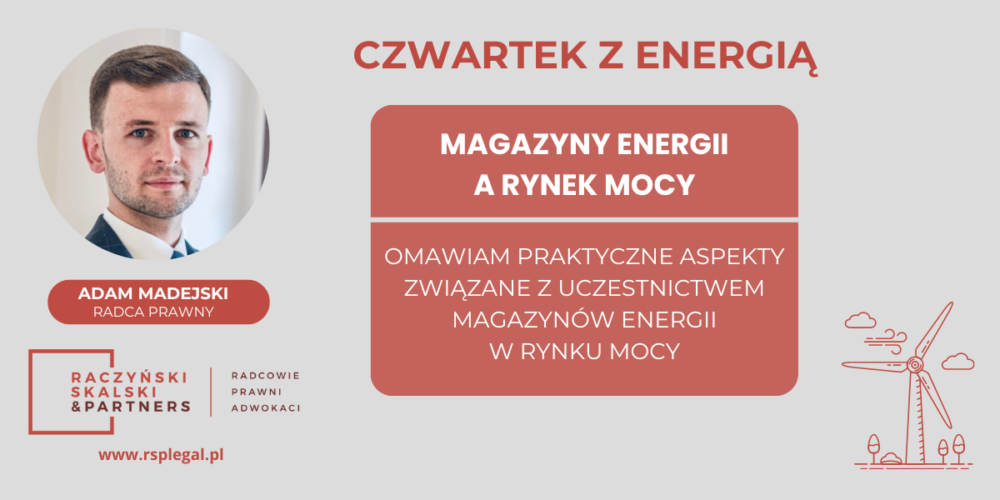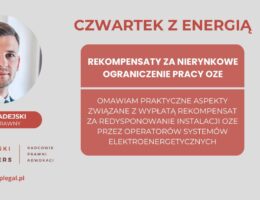According to available data, the installed capacity of electricity storage facilities will gradually increase. The use of these facilities will be possible not only to secure surplus electricity, but also to immediately replenish missing amounts of energy in situations of system imbalance.
Thanks to the developing power market, energy storage facilities can both secure an important source of income for themselves and contribute to the balancing of the power system. There is growing interest in investments in this area, but it is worth noting a number of limitations that exist with regard to participation in the power market. Admittedly, they apply to all technologies, but for energy storage they are of particular importance, as they significantly limit the transactional opportunities to which we have become accustomed in the RES market.
1. Participation in the auction and investment plans
If a future energy storage owner is considering participating in a power auction, he should carefully prepare for such a step. Not only for organizational reasons – auctions are held every year – but primarily for investment reasons. Participation in the auction is, as a rule, subject to a two-stage certification. Each power market unit (i.e., one that can participate in its operation, both in reduction and power obligation) is first subject to general certification, which, if successful, results in an entry in the power market register (Article 12 of the Power Market Law). Subsequently, it is necessary to carry out certification for the main or supplementary auction, which constitutes the final qualification of a power market unit to participate in the auction for a given delivery year (Article 15 of the Power Market Law).
The certification process and also the organization of the auction mean that investment plans should be sufficiently specified. Information and data about the unit are placed in the register, and later modification of the parameters may prove troublesome in light of the requirements that are placed on power suppliers at the stage of newly built investments. Indeed, it should be emphasized that in the case of units yet to be built, it is also necessary to obtain a conditional certificate, which in turn requires the power supplier to provide security (Article 50(1) of the Power Market Law). While an exemption from this obligation is possible, it is only for entities that have an appropriate financial rating (at least BBB- or Baa3 – § 7 of the Energy Minister’s regulation on financial security to be provided by power suppliers and pre-auction participants).
A power supplier, if it wins the auction, is also required to demonstrate, within the first 24 months after the announcement of the final results of the auction, that it has incurred investment expenditures of at least 10% of the amount of the required investment expenditures, as well as to conclude implementation agreements (Article 52 of the Power Market Law).
2. Power contract
Winning a power market auction results in the conclusion of a so-called power contract by operation of law, for a fixed term, between the power supplier, PSE S.A. as the power market operator and Zarządca Rozliczeń S.A. as the clearing operator (Article 44 of the Power Market Act). The agreement is concluded in electronic form under pain of nullity (Article 45 of the Power Market Act). The agreement is non-negotiable and its template is attached as an appendix to the Power Market Regulations. Any changes to its content are made by amending the regulations.
The peculiarity of the power contract is that the scope of regulation of the rights and obligations of the parties is largely transferred to the content of the power market regulations, which, together with the Law and the power contract, form the overall framework for the legal relationship between the power supplier and the market operator and the clearing operator. It is not possible to transfer rights and obligations from the power contract, except in the two situations described in Section 3 below. This is a significant limitation, however, dictated by the need to protect the market as a key tool for balancing system needs. Entity changes could negatively affect the fulfillment of the power obligation, which in turn could have disastrous consequences for the power system.
3. Restrictions on the divestment of a project or installation
An important feature of the power market is that the power supplier is, in principle, obliged to participate in the system for the entire period for which it won the auction. In the case of energy storage facilities, this is an important consideration, because when estimating the financial aspects of the entity’s operations and return on investment, one must take into account that it is not possible to quickly divest a project, much less withdraw from the power market.
Entity changes are allowed only in two cases:
-
- under the so-called secondary power market, i.e. between power suppliers that have won auctions for the same year of supply, or
- as part of entity transformations under the provisions of the Commercial Companies Code.
It is not possible to transfer the right to participate in the power market on the basis of an agreement to transfer rights and obligations or even as part of the sale of an organized part of an enterprise.
In the secondary power market, entities that are participants in the power market can transact in future power obligations, as well as in an unperformed obligation when it should have been performed. The parties to the transaction themselves choose the form in which the contract will be executed, but it is effective only after it has been registered in the power market register and the operator has not objected to it (Article 49(1) of the Power Market Law).
As for the transfer of ownership of the unit as a whole, while retaining the right to participate in the power market, this is possible only on the basis of a conversion carried out under the provisions of the Commercial Companies Code. In such a situation, it is necessary:
-
- separation of the entity into a new commercial company,
- merger with the purchaser’s company, such as a special purpose vehicle established for this purpose.
The transformation carried out in this way requires notification of changes to the power market register. The notification is verified by the power market operator for compliance and completeness.
The above restrictions significantly affect the possibility of managing energy storage with the intention of selling it later, since participation in the power market on the one hand provides a source of income, but “binds” the power supplier for the duration of the power obligation. Therefore, this is an important market deviation from the popular in the RES industry acquisitions of generating facilities, both planned, ongoing and existing projects. Any investor considering the acquisition or construction of an energy storage facility should carefully verify that participation in the power market will not become a constraint on business plans.



